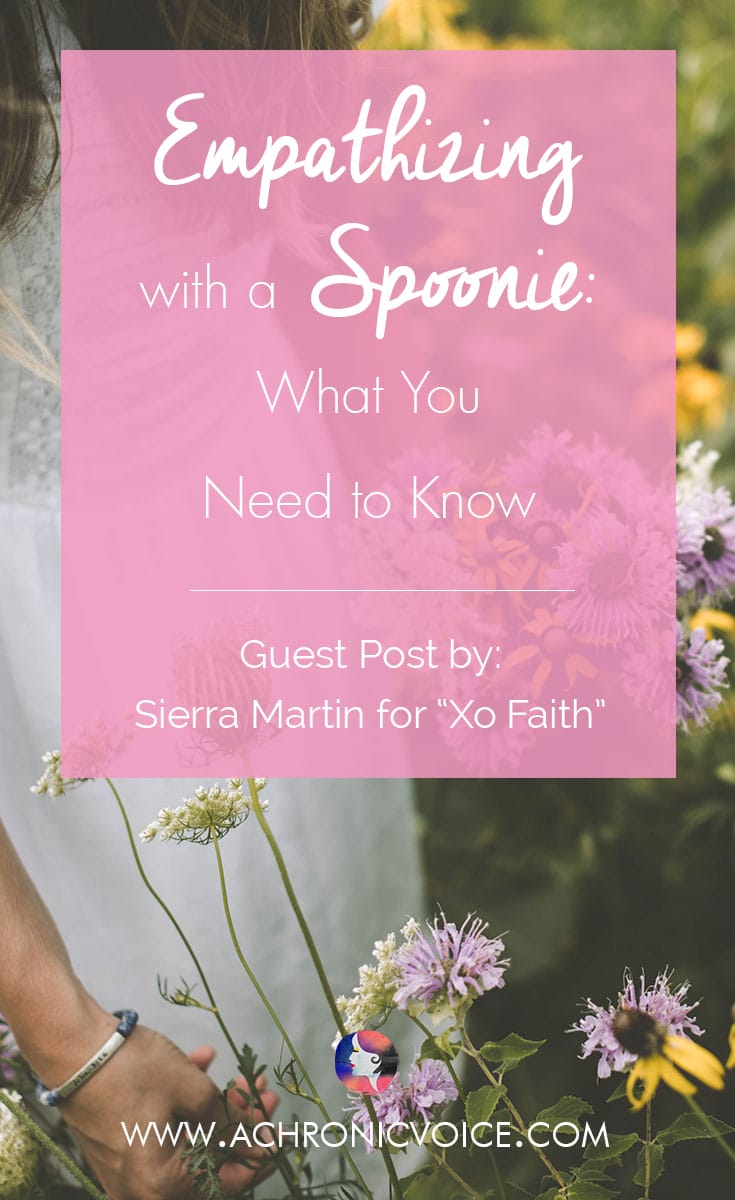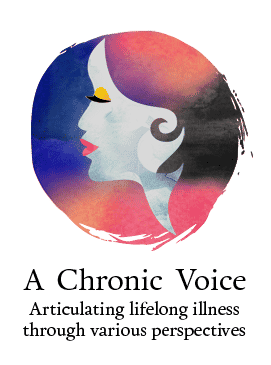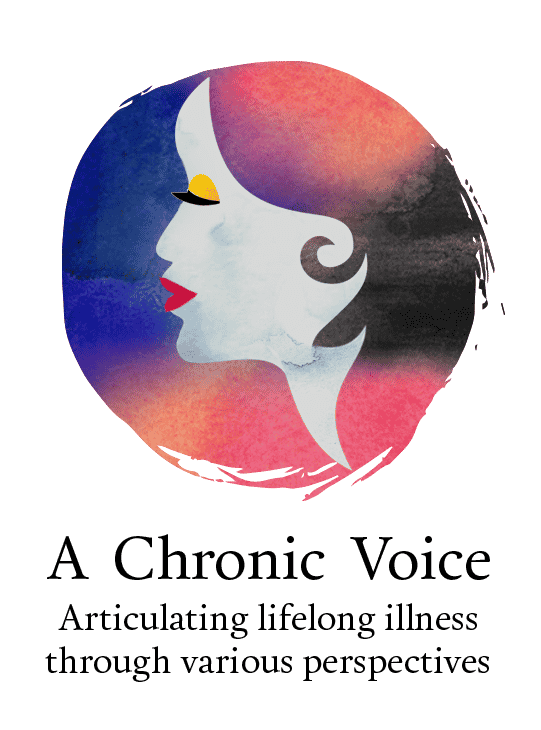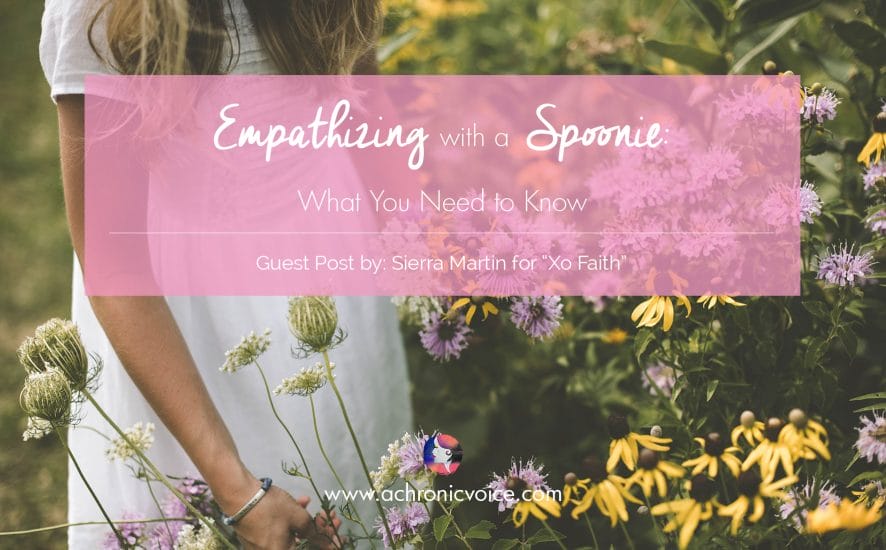*Note from A Chronic Voice: Many people who live with chronic illness have probably heard of the term ‘spoonie’, if not, the original explanation can be found on Christine Miserando’s site. I personally use it because it’s much more succinct than repeating ‘chronic illness person’ ad nauseam 😉 Sierra is a writer for “XO Faith”, and she’s here today to raise awareness on what it means to live in constant pain, what empathy is about, and how you can show some support:
Table of Contents
Many People Live with Chronic Pain
Chronic pain is a widespread issue that affects nearly 1.5 billion people around the world and approximately 1 in 10 Americans. In fact, chances are you, or either someone you know suffers from chronic pain. For some, pain is invisible, hiding in plain sight, and for others, it’s displayed for all to see. The NIH notes that chronic pain can range originate from a chronic illness, a barrier to cancer treatment, and can even occur alongside other diseases and conditions (i.e., depression, PTSD, traumatic brain injury). Additionally, the NIH reports that chronic pain affects more Americans than diabetes, heart disease, and cancer combined.
The Rewarding Skills You Develop
However, even if you don’t suffer from chronic pain, that doesn’t necessarily mean you can’t or don’t know how to help someone you know who does. The grim reality of chronic pain is that it can be difficult for not just those suffering from it, but also those around them as well. Empathizing and understanding those with chronic pain can sometimes be complicated and confusing. It will never just be a standard relationship, whatever type it may be, but it can also be rewarding in so many ways.
Those suffering from chronic pain have to develop patience, perseverance, and tolerance beyond that usually held by others. Additionally, they tend also have excellent listening skills and empathy due to knowing and understanding what it feels like to be in pain, unheard, and misunderstood. Now, this does not apply to everyone who has chronic pain, but it does describe a good majority.
What the Research Shows
In research found by The Good Body, it was discovered that 77% of people report feeling depressed due to their chronic pain; 51% of chronic pain suffers often think that they have no control over their pain; and 20% report that their pain disrupts their sleep at least a few nights a week.
Only recently are we beginning to talk more about chronic pain in open light, and rather than minimize what patients were feeling, encourage them to talk about it. Even more exciting is the discovery and research into central sensitization, where the brain begins to rewrite itself and the nerves after being in constant pain for so long. This finding sheds light and brings genuine legitimacy to the claims of pain for so many patients.
End the Stigma
Knowing what chronic pain is like for others makes it easier to empathize with them. People with chronic illnesses just need someone to be there for them. The reality is that for many with chronic pain they often feel like a burden to their friends and family. Whether it is merely asking for help for simple things, or even just mentioning how severe the pain is on a given day; feeling like a burden is one of the most common concerns among those suffering from chronic pain.
Complaints are Cries for Help
Often they give so much to others, but have no one to hear how much they hurt or to help them with the little simple things that they struggle with yet don’t want to admit to being in pain.
By just stopping for a moment to realize that you may get to walk away, but they are stuck in the same body that and trapped in pain, day in and day out, it becomes a little easier to empathize with them. Many of those in chronic pain don’t want to complain, but if someone is in pain every day, then is it expected that they will complain at some point? That is not to say there aren’t those who do not complain. Some could have a better pain management system. Remember, complaints about pain stem from how a person sees his or her pain.
A Little Empathy Goes a Long Way
The Merriam-Webster definition of empathy is: the action of understanding, being aware of, being sensitive to, and vicariously experiencing the feelings, thoughts, and experience of another of either the past of present without having the feelings, thoughts, and experience fully communicated in an objectively explicit manner.
Empathy is an important part of our world and life. It helps keep us human and ensures that we are looking after one another. Merriam-Webster defines empathy as “the action of understanding.” All empathy requires time and the want to care about the feelings of the other person.
Sometimes it becomes all too easy to get caught up in our own lives, and while we may have good intentions, we only care about the surface details of those whose lives’ may be more complicated, for example those with chronic pain. While that may be slightly understandable, we also miss out on the chance to cultivate better relationships with those we know who have chronic pain, and we also ask those with chronic pain to hide that side of them from us. Resulting in neither person winning. By simply taking the time to realize that empathizing with those with chronic pain is not as daunting as it seems, it opens both parties up to the opportunity for a better relationship.
If you liked this article, sign up for our mailing list so you don’t miss out on our latest posts! You will also receive an e-book full of uplifting messages, quotes and illustrations, as a token of appreciation!

Contributor Bio




It is so true that most people I meet with chronic pain are more caring to others than others, I think it is because we know what it is like to suffer. I think this article though can help others to understand better about how we feel and for that I am thankful. I do not get a lot of sympathy from my family and that can be hard, I hope they read this and it helps them be more understanding.
Hi Beverly,
Yes indeed empathy seems to be something we’ve lost touch with as a whole, but is so important. It could mean the world to somebody, and even make the difference between life and death, or a life filled with meaning or meaninglessness.
Thank you for reading and sharing your thoughts, and I hope your family will slowly learn, there is always hope 🙂 xxx
Great article, Sierra!
While chronic pain is devastating and debilitating to all who deal with it, my heart goes out to young women just beginning adult life and careers.
Pain became my daily companion just a few short years ago as my youngest child was completing high school. I have much respect for anyone who can raise a family–and in some cases, remain employed–while pain ravages their body. The way I feel now…I can barely take care of myself. ?
Is non-narcotic pain control too much to wish for? Am I riding unicorns and tilting at windmills? ?
Felicia,
Thanks! And absolutely! It is almost a sad thing that merely wishing to be only somewhat pain-free is basically the same as believing in finding a pot of gold at the end of a rainbow. I truly have so much respect for the many wide range of all those of us who suffer and fight with chronic pain. Some of us are trying to raise families, and others are just trying to finish school and graduate. Regardless of our age and standing in life however, one thing binds us together; our fight against chronic pain. With that in mind,
Never Stop Fighting!
– A Fellow Warrior